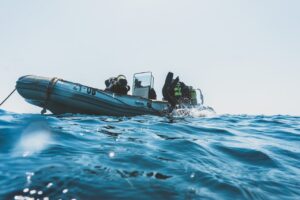One of the most exhilarating aspects of scuba diving is encountering marine animals in their natural habitat. From encountering playful dolphins that weave effortlessly through the water to swimming alongside majestic manta rays gliding gracefully by, these experiences leave lasting memories. And if you’re lucky enough, you might even come across an awe-inspiring scene of a massive humpback whale elegantly breaching the surface before disappearing back into the deep blue sea. Scuba diving isn’t just about exploring exotic locations and meeting fascinating underwater creatures; it’s also an opportunity for personal growth and self-discovery. As you delve deeper (both literally and figuratively) into this activity, your confidence grows along with your skills. The more dives you complete, the more comfortable and at ease you become underwater. It’s a chance to challenge yourself physically and mentally while embracing nature’s wonders beneath the waves.
Choosing the right scuba diving course
Choosing the right scuba diving course can make all the difference in your journey to becoming a certified diver. It’s not just about finding a reputable dive center; it’s about understanding what type of course will suit your needs and learning style. Consider factors such as class size, instructor experience, and curriculum when making your decision.
One important aspect to consider is the class size. While smaller groups may sound more appealing for personalized attention, larger classes often offer a more diverse learning environment with fellow students sharing their experiences and perspectives. Additionally, be sure to inquire about the student-to-instructor ratio during dives as this can greatly impact the quality of instruction you receive underwater. Another crucial factor is instructor experience. A knowledgeable and experienced instructor can make or break your scuba diving course. Look for instructors who have been teaching for several years and have logged a significant number of dives themselves. Their expertise will provide you with valuable insights and guidance throughout your training. Don’t forget to review the course curriculum before signing up. Each certification agency has its own set of standards, so ensure that the course aligns with international diving organizations’ requirements such as PADI or SSI. Moreover, consider if additional skills or specialties are included in the program that might enhance your diving abilities beyond basic certification.
Get familiar with scuba diving equipment

Scuba diving equipment is a vital component of any diver’s experience. Each piece serves a specific purpose to ensure comfort, safety, and ease underwater. One of the most important items is the scuba tank, which stores the compressed air that allows divers to breathe while exploring beneath the waves. It’s imperative to understand how to check and properly secure the tank before each dive to avoid any potential mishaps or malfunctions. Another crucial piece of equipment is the buoyancy control device (BCD), which allows divers to control their buoyancy in the water. This device enables them to adjust their depth and positioning effortlessly, making it essential for maintaining stability during dives. Becoming familiar with your BCD and practicing its operation will help you feel at ease when controlling your buoyancy underwater. Getting acquainted with your dive computer is essential for maximizing safety and time spent underwater. These devices monitor depth, time spent diving, decompression limits, and other critical information that helps prevent decompression illness or nitrogen narcosis. Familiarizing yourself with its interface before diving will enable you to interpret these readings effectively so as not only to follow but also to understand what they mean in terms of safety.
Dive planning and navigation techniques
Dive planning and navigation techniques are crucial skills for scuba divers, as they ensure a safe and enjoyable underwater experience. Before descending into the depths, it is important to plan your dive carefully. This involves assessing factors such as current strength, water temperature, and visibility, which can all affect your safety and comfort. By understanding these variables beforehand, you can make informed decisions about the depth and duration of the dive, as well as the necessary equipment.
When it comes to underwater navigation, there are several techniques that can help you find your way back to the boat or shore. One effective method is using a compass coupled with natural features of the environment. By taking note of coral formations or distinctive landmarks before diving in, you can use them as reference points when navigating underwater. Another useful technique is called square diving, where you swim away from a fixed point for a certain distance before turning 90 degrees and swimming another set distance. This allows for easy retracing of your path back to the starting point. Remember that proficient dive planning and navigation require practice to become second nature. A successful scuba diver not only knows how to read compasses but also develops situational awareness by paying attention to their surroundings at all times while underwater. So next time you embark on a scuba adventure, take some extra time to plan your dive route meticulously and navigate with confidence—these skills will enhance both your safety and enjoyment beneath the surface.
Dive into a successful scuba diving journey

In conclusion, embarking on a scuba diving journey can be an incredibly rewarding experience. Not only will you explore the wonders of the underwater world, but you will also challenge yourself in ways you never thought possible. As with any new endeavor, it is important to approach scuba diving with patience and an open mind. Be prepared to invest time and effort into developing your skills and knowledge, as this will greatly contribute to your overall enjoyment and safety.
Remember that scuba diving is not just about learning new techniques or acquiring certifications; it’s about immersing yourself in a whole new world of beauty and tranquility. Take the time to appreciate the breathtaking marine life, coral reefs, and unique landscapes that you encounter beneath the surface. Keep practicing your skills regularly to maintain confidence in your abilities and continually improve as a diver. Don’t forget that safety should always be your top priority. Stay alert, follow protocols diligently, monitor your equipment closely, and never compromise on proper training or adherence to regulations. By doing so, you can ensure that each dive is not only successful but also enjoyable for years to come. So buckle up those fins, grab your wetsuit, and dive headfirst into this incredible adventure – a lifetime’s worth of unforgettable experiences awaits.